Côte de boeuf is exactly the same thing as a single-bone rib of beef. The bone can be trimmed off to create a ribeye steak, which the French call ‘entrecôte’. These cuts are all essentially the same thing with different names.
A côte de boeuf is an expensive thing. One of them will cost about £15, but that is not so bad when you remember that it will serve two people easily. A cut of meat this good should be sourced from the best cattle you can get access to. For me, this is grass-fed Aberdeen Angus. You can travel the world eating beef from all corners of the globe, and you will still struggle to beat the quality of grass-fed Angus.
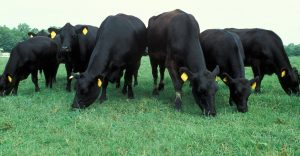
If you happen to have a Netflix subscription, then you can geek out over beef production here:
https://www.netflix.com/watch/80048481
When we were looking for advice on cooking a côte de boeuf, we were delighted to find our Twitter friends Morley Butchers of London top of the heap on Google. The principle is to treat it like any other steak, but to give it a bit of help with an oven. Institut Paul Bocuse Gastronomique, normally the mothership of technique, skips the oven, but I think that is a recipe for disaster.
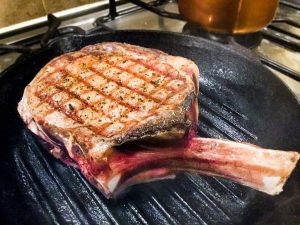
Morley Butchers can be found at 23 Broadway Parade, Crouch End, London, N8 9DE.
Côte de boeuf
Ingredients
- 1 côte de boeuf
- 2 tbsp olive oil
- Sea salt and freshly ground black pepper
Instructions
Ensure that the beef is up to room temperature by pulling it out of refrigeration for an hour before cooking.
Preheat an oven to 220˚C.
Drizzle both sides of the beef with olive oil and spread over with a brush. Season liberally with black pepper and sea salt.
Heat a griddle pan until very hot. Place the beef in the pan and sear on high for 4 minutes. You are looking for a good crust and well-defined griddle stripes. Turn the steak over and cook the other side for 4 mins.
Put the pan directly in the centre of oven and roast for 15 minutes for rare, and a further 5 mins for medium rare. Use a meat probe to determine doneness. For medium rare, you need to take the beef out when the centre is 40˚C. The meat will continue to cook and reach 54˚C while resting. Rest for 10–20 mins uncovered before carving, checking the internal temperature as you go.
Notes
A cut as good as côte de boeuf does not need any frippery. Serve with chips and a salad. Plop some horseradish on the side. If you want an interesting flavour, nestle two branches of lovage either side of the meat while it is cooking.

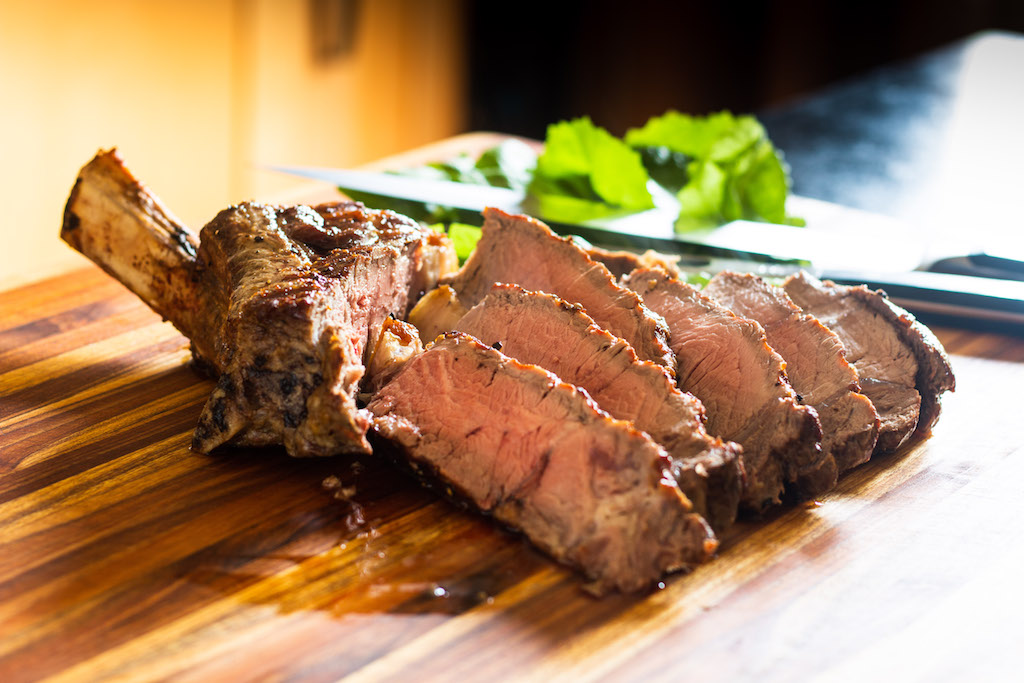


 (67 votes, average: 3.64 out of 5)
(67 votes, average: 3.64 out of 5)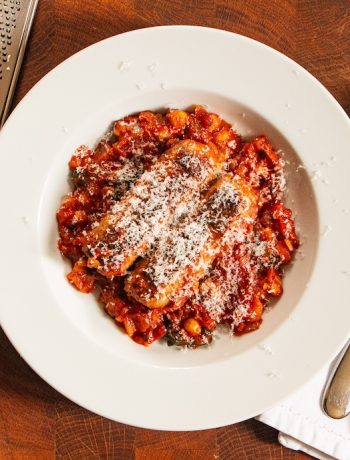
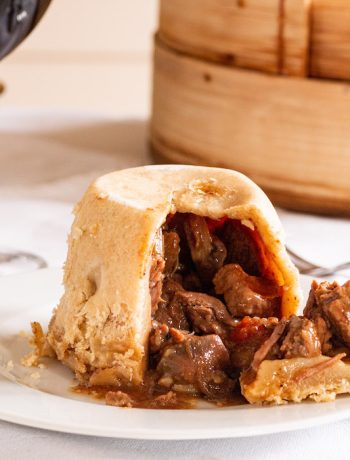
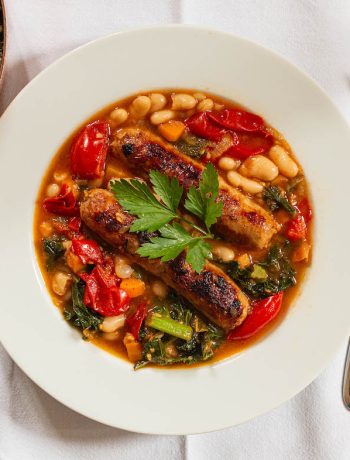
13 Comments
Paul Cody
30/11/2019 at 12:03 pmHave to agree that grass fed beef is the only way to obtain the best flavour. You are what you eat, and with this in mind we started to keep a few cattle. We now have a herd of 50 Grass Fed For Life animals, all Galloway Cattle, and in order to obtain the best flavour we don’t kill ours in till they are over 3 years of age. Yes the hobby has got a little out of hand.
We can deliver nationwide by courier.
More details http://www.suttongalloways@yahoo.co.uk
Nigel Eastmond
30/11/2019 at 4:53 pmHang on Paul … you are not that far from us – we are in north Derbyshire. Maybe we could order some of your beef to try.
shoukry
18/04/2020 at 1:29 ami am very happy to be here thank you so much i had great knowledge from your encyclopedia relay its great i hope more success to all thank you again
Nigel Eastmond
19/04/2020 at 7:16 pmGlad to help!
JND Kelly
19/07/2020 at 3:03 amYou say, “Season literally with black pepper and sea salt.” I think you mean “liberally”?
Phil Crookes
09/09/2021 at 8:15 pmI cooked a single rib (on the bone) this way last night. Superb. Bang on. The only slightly modification was to melt a knob of butter on the steak as it went in the oven which lends even more richness to the maillard effect crust. As you say, home made chips and creamed horseradish (and maybe a Rioja or Tuscan red!) are all hats needed . Btw I cooked its twin rib (I bought a double and halved it) a couple of days before, using sous vide then adding the crust at the end in a pan. Tender, yes, but lacking that roast beefy flavour on the outside and almost gelatinous on the inside. A useful experiment for me.
Nigel Eastmond
18/09/2021 at 12:45 pmI am glad that went well – these are not cheap cuts. For your butter, you might also try using a compound butter with garlic and herbs in it. Another standard stunt in our kitchen is to lob in a branch of lovage to flavour the pan juices. We grow a lot of it every year, and it is superb with beef.
Duncan Haigh
11/06/2022 at 7:42 amPhil were you the Chef at Faraday in the mid 1990s
Henry Barnett
23/10/2021 at 11:42 pmSurely you shouldn’t pierce the meat with a meat thermometer. The juices will leak out and the meat will dry.
Nigel Eastmond
24/10/2021 at 5:51 pmNope. That does not happen. Meat is completely porous and releases fluid anyway. One, poxy meat thermometer makes absolutely no difference.
Graham Ritchie
23/12/2021 at 12:50 pmHi,
I’m planning to do a cote de boeuf for Boxing Day – it weighs in at 3.75 kg. What timings should I use – the times you give are, I suspect, for 1 rib – mine has 4. And what core temp should I aim for.
Thanks, Graham
Nigel Eastmond
23/12/2021 at 6:20 pmAh. A rib of beef joint that size is a whole other thing. We have roasting times under ‘R’ on our Little Black Book page. This will deliver medium rare.
10 what is the difference between cote de boeuf and rib of beef Ideas - Món Ăn Ngon
17/01/2023 at 4:34 pm[…] Source: https://noseychef.com/2018/12/23/cote-de-boeuf/ […]